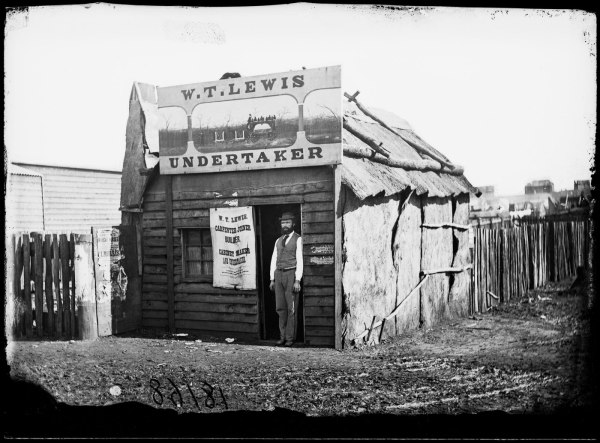
Shortly after my arrival I met a gentleman by the name of Post, who had been to San Francisco in ’47 and was a confidential clerk of General Williams, who was keeping a wholesale dry-goods store. I told him I had something over eight thousand dollars which I should like to invest in dry-goods. He informed me that they were over-stocked in clothing, and that if I wished to lay out my money in that way, I could get goods at very low prices. I purchased of them to the amount of over eight thousand dollars, and took passage in a Spanish bark, the owner of which was named Luca, and arrived in San Francisco on the second day of January, 1848.
On my arrival Robert A Parker looked at my invoices and made me an offer of one hundred per cent on first cost, he also agreed to pay all duties and freight charges. I took up with his offer. This transaction was the starting point of the building of the Parker House, where now stands the Old City Hall. After my return from the Islands, Captain Leidsoff sent for me and made me a very liberal proposition. He wanted me to take a lease of the City Hotel. When I asked Parker what he thought about taking the hotel, he said he did not wish me to have anything more to do with it, and if I was willing to put in what money I had, he would find the balance, and we would build a large hotel, in partnership.
Parker had a piece of land and the balance of a fifty vara lot, which we leased from Southard and James Gleason. A short time afterwards we purchased the whole of the land. We then got Stephen Harris, a carpenter, to make out a bill of lumber, and to take charge of the building. In those days it was not such an easy thing to get lumber, although, prior to the interest in the mines, it was cheaper than it is now.
Lumber was got out by what they called pit sawing, and we had about ten pits at work getting lumber out for this house. We first commenced in February, 1848. Most of the lumber was got out on the Widow Reed’s place. She was a sister of Francisco Sanchez. Mrs. Reed’s second husband was a man known throughout the country as “Three fingered Jack, the desperado.”…
At the time we undertook to build the Parker House it was no easy task as it would be now-a-days, as there were many obstacles to encounter. In the first place, everything had to be done by hand, and the greatest difficulty we found, was in keeping the pit sawyers at work, as most of them were runaway sailors, and as soon as they could obtain money they were bound to go on a spree.
I will here make mention of one instance: There was a portion of the frame lumber which the carpenter wanted very much, and I had promised the men to bring them over on my next trip a barrel of whiskey. On my arrival I found all the men down to the landing waiting for me. They had a load of lumber for me on shore.
I had acquainted Parker with what I had promised the men; but, he thought it best to wait another trip, in order that they might get out the balance of the framing lumber before I took any whiskey over, and to tell them, that I had quite forgotten it. I took with me all the other articles which they had ordered, and I told them that I had on board everything they had ordered except the whiskey, and that I would bring that, without fail on my next trip; but that did not suit at all. They said they had to get that barrel of whiskey, or else I could not have one stick of the lumber.
I begged very hard for the lumber, promising them that I would surely return with the whiskey on the day following; but, all of my arguments were of no avail. I had to send two men back with the boat to San Francisco for the whiskey. As soon as I sent the boat away they all turned in and loaded the scow with lumber, and it was done in quick time. On the arrival of the boat with the whiskey they all had a good time for the balance of that week, and I could get no more lumber from them for over ten days.
Another person got out lumber for us at the Court of Madera, by the name of James Murphy, a brother of Santa Clara Murphy. This man we could depend on, but it was a bad place to go to, as we could not put on board a full cargo, on account of there not being enough water to float the scow.
When runaway sailors once reached the shelter of the woods they were perfectly safe, as no person dared to go after them, for if they did, they never would return alive. The scow we used was built at Saucelito for the purpose of bringing down brick from the yard near the Old Mission. Robert A. Parker was the owner of the saw, and he also had an interest in the brick-yard. We had got the lumber for the frame of the building all out, also the flooring and weather-boarding when the gold fever started; and the only thing we could then do was to pile up the frame and let things come to a standstill, as every man left for the mines. At this time carpenters wages was three dollars per day…
John Henry Brown
Reminiscences and Incidents of “the Early Days” of San Francisco – 1886
—Jeff Burks